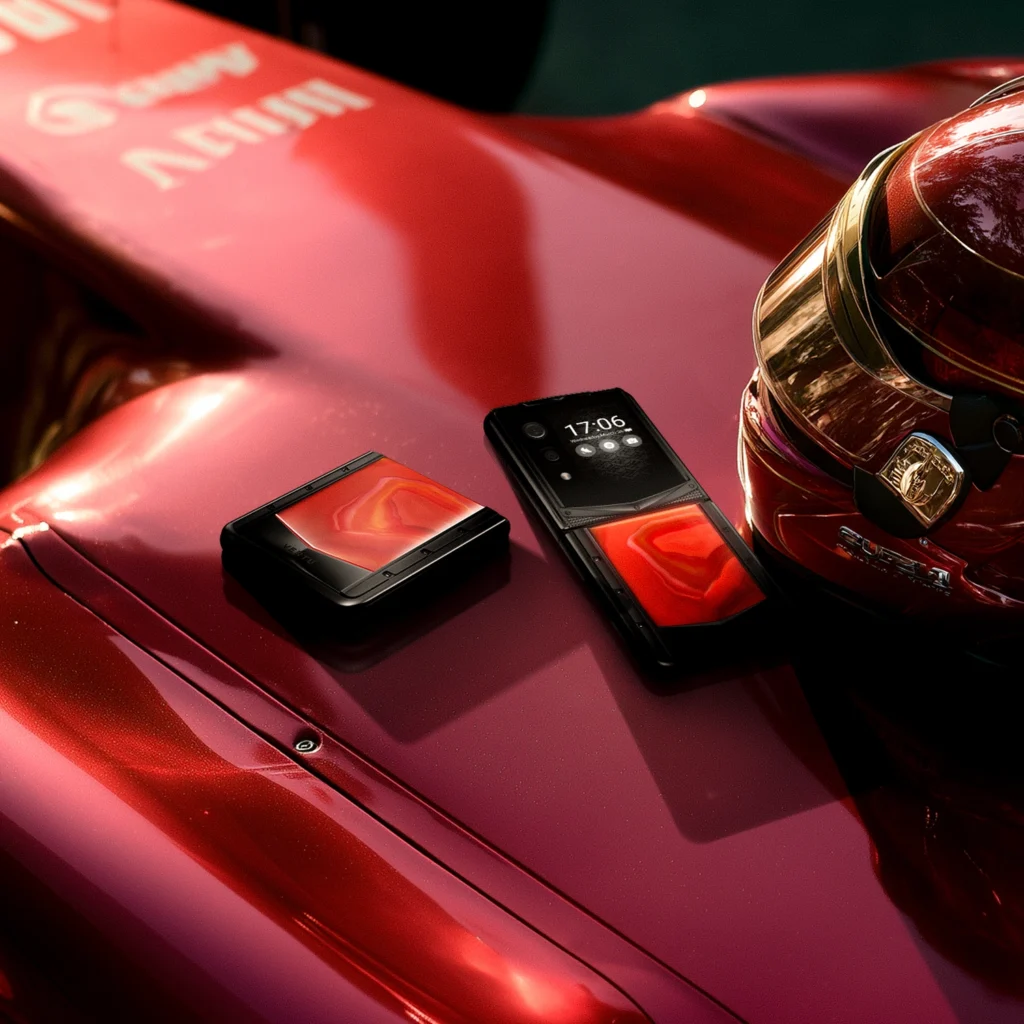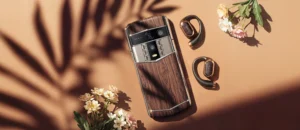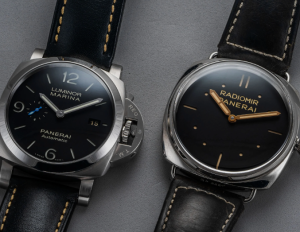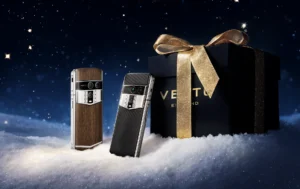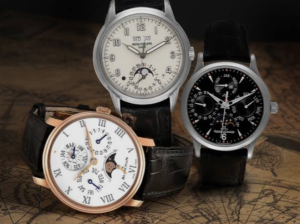In a world dominated by mass-produced rectangles of glass and aluminum, the concept of a truly handcrafted luxury mobile phone stands as a defiant statement against uniformity. While millions carry identical devices churned out by automated assembly lines, a select few understand that technology—something we interact with hundreds of times daily—deserves the same artisanal attention as fine watches, bespoke suits, or luxury automobiles. This is the philosophy that defines handcrafted luxury phones: devices where every element reflects human skill, premium materials, and uncompromising attention to detail.
The Lost Art of Handcrafted Technology
The Mass Production Era: Modern smartphone manufacturing prioritizes efficiency and scale. Robots assemble components in minutes, quality control involves statistical sampling rather than individual inspection, and the human touch is deliberately engineered out of the process. The result? Technically proficient devices that lack soul, character, and the indefinable quality that comes from human craftsmanship.
The Luxury Alternative: Handcrafted luxury phones reject this paradigm entirely. These devices are assembled by individual craftspeople who sign their work, taking responsibility for quality in ways no automated system can replicate. Each phone receives hours of human attention—from material selection through final inspection—creating objects that transcend mere functionality to become genuine works of art.
Why Handcrafted Matters: Beyond romantic notions of artisanship, handcrafted construction delivers tangible benefits. Human craftspeople notice imperfections that statistical quality control misses, make judgment calls that algorithms cannot, and bring problem-solving creativity to assembly challenges. The result is superior build quality, tighter tolerances, and devices that age gracefully rather than rapidly deteriorating.
Materials That Matter: Mass-market phones use materials chosen for cost-efficiency and ease of manufacturing. Handcrafted luxury phones select materials for their inherent beauty, durability, and sensory qualities—exotic leathers that develop character with age, precious metals that convey weight and substance, and gemstones that catch light with every movement.
The Vertu Legacy: Defining Handcrafted Luxury Phones
For over two decades, Vertu has stood as the definitive name in handcrafted luxury mobile phones. Founded in 1998 as a subsidiary of Nokia before becoming independent, Vertu pioneered the concept that phones could be luxury objects in their own right—not merely technology devices with expensive cases, but genuine luxury goods where craftsmanship, materials, and exclusivity justified premium positioning.
The Vertu Difference: Every Vertu phone is assembled by a single craftsperson in controlled environments ensuring consistency and accountability. These artisans undergo extensive training, learning not just assembly procedures but the philosophy of luxury craftsmanship—understanding how materials behave, recognizing quality variations, and developing the judgment necessary for creating exceptional objects.
Signature of Pride: Each Vertu device carries the signature of its craftsperson—a practice borrowed from luxury watchmaking and haute couture. This isn't marketing theater; it's genuine accountability. When a craftsperson signs their name to a device, they stake their professional reputation on its quality, creating motivation that no corporate quality control system can match.
Materials Sourcing: Vertu maintains relationships with the world's premier material suppliers—Italian tanneries producing exceptional leather, Swiss manufacturers of sapphire crystal, and certified sources of precious metals and gemstones. This supply chain ensures that every component meets luxury standards before assembly even begins.
British Heritage: Vertu's British origins inform its design philosophy—understated elegance over ostentatious display, quality that reveals itself through use rather than shouting for attention, and the confidence to prioritize longevity over disposability.
Quantum Flip: The Art of the Fold
The Quantum Flip represents Vertu's reimagining of the classic flip phone form factor—a design that dominated mobile communications for decades before touchscreen rectangles became ubiquitous. However, this isn't mere nostalgia; it's a thoughtful exploration of how the flip mechanism can be executed with luxury materials and handcrafted precision.
The Hinge as Sculpture: The flip phone lives and dies by its hinge mechanism. Cheap flip phones use simple springs that weaken over time; the Quantum Flip employs precision-engineered hinges crafted from stainless steel or titanium, designed to maintain perfect action through hundreds of thousands of cycles. The satisfying snap of opening and closing isn't accidental—it's the result of careful engineering and manual adjustment during assembly.
Dual Display Elegance: Modern flip phones require two displays—an external screen for notifications and an internal screen for full interaction. The Quantum Flip uses sapphire crystal for both, providing scratch resistance that maintains visual clarity for years. Hand-polishing these crystals during assembly ensures optical perfection impossible with automated processes.
Material Symphony: The device's body combines multiple premium materials—perhaps a titanium frame for strength, exotic leather for grip and warmth, and precious metal accents for visual interest. Handcrafted assembly allows these disparate materials to integrate seamlessly, with leather precisely cut and stitched to fit perfectly against metal components.
Compact Luxury: When closed, the Quantum Flip achieves a compact footprint impossible with standard smartphones. This portability appeals to luxury consumers who value elegance and convenience—the phone slips effortlessly into evening bags, suit pockets, or clutches without the bulk that makes modern phones inconvenient for formal wear.
The Theatre of Communication: There's ceremonial quality to flipping open a phone to answer calls and snapping it closed to end conversations. This physical interaction adds intention and drama to communication—answering a call becomes a deliberate act rather than a casual swipe. For luxury consumers who appreciate ritual and ceremony, this enhances the daily experience.
Nostalgic Sophistication: The flip phone evokes an era when mobile phones were status symbols and communication tools rather than all-consuming social media devices. The Quantum Flip captures this nostalgia while incorporating contemporary technology—5G connectivity, modern processors, and quality cameras within the classic form factor.
Customization Options: Handcrafted production enables extensive customization impossible with mass manufacturing. Buyers can select from various leather types (calfskin, crocodile, lizard), metal finishes (gold, platinum, rose gold), and even gemstone accents—creating genuinely unique devices reflecting personal taste.
Agent Q: Redefining the Smartphone Form
The Agent Q takes an even more innovative approach to handcrafted luxury phone design with its distinctive gull-wing door opening mechanism—a feature borrowed from exotic automobiles and adapted to smartphone architecture through precision engineering and artisanal assembly.
Gull-Wing Innovation: The Agent Q's signature feature is its dual gull-wing doors that open upward from the device's body, revealing the screen and creating a dramatic presentation unlike any other phone. This mechanism requires extraordinary precision—the doors must align perfectly, open smoothly, and lock securely, all while maintaining aesthetic elegance. Such complexity demands handcrafted assembly where skilled craftspeople adjust and test each mechanism individually.
Engineering Meets Art: The gull-wing doors aren't merely decorative—they protect the screen when closed, eliminate the need for separate cases that hide the phone's beauty, and provide a satisfying mechanical interaction that reminds users they're holding something special. The engineering challenge of creating this mechanism in a device measuring millimeters in thickness represents a triumph of design ambition over manufacturing convenience.
Premium Material Integration: The Agent Q's complex form demands careful material selection and integration. Aerospace-grade titanium provides the strength necessary for the hinge mechanism while maintaining manageable weight. Sapphire crystal covers not just the screen but also camera lenses, ensuring optical clarity that glass cannot match. Exotic leathers wrap portions of the device, selected for texture and durability while being precisely cut to accommodate the mechanical components.
Attention to Sonic Details: Luxury isn't just visual and tactile—it's auditory. The sound of the Agent Q's gull-wing doors opening and closing receives as much attention as their mechanical function. Craftspeople test and adjust mechanisms to achieve the perfect acoustic signature—a substantial yet refined click that communicates quality and precision.
AI Integration with Luxury: Beyond its physical design, the Agent Q incorporates artificial intelligence features that enhance functionality without compromising the luxury experience. The AI learns user preferences, optimizes performance, and provides assistance while respecting privacy—a balance that mass-market AI implementations often fail to achieve.
Display Excellence: The internal display uses cutting-edge AMOLED technology with exceptional color accuracy and brightness. However, luxury is in the details—Vertu calibrates each display individually during assembly, ensuring color consistency and optimal performance that varies in mass-produced phones due to manufacturing tolerances.
Camera Sophistication: While the Agent Q prioritizes design and craftsmanship, it doesn't compromise on photography. Multiple cameras with premium sensors and precision-ground lenses provide excellent image quality. The camera modules integrate flush with the body through careful hand-assembly ensuring alignment and sealing that protects against dust and moisture.
Biometric Security: Fingerprint sensors and facial recognition hardware receive individual calibration during assembly, ensuring reliable performance across varying conditions. This attention to security detail reflects understanding that luxury consumers often handle sensitive information requiring robust protection.
Personalization Possibilities: Like the Quantum Flip, the Agent Q offers extensive customization. Buyers specify metal finishes, leather types, and even gemstone accents. Some clients commission entirely bespoke versions with unique material combinations or engraving—possibilities enabled only by handcrafted production methods.
The Experience of Handcrafted Luxury
Unboxing as Ceremony: Handcrafted luxury phones arrive in presentation packaging that reflects the device's quality—wooden boxes, leather cases, or custom-designed containers that become keepsakes. Opening a Vertu phone isn't routine unboxing; it's an experience designed to honor the craftsmanship within.
Tactile Satisfaction: The weight, balance, and surface textures of handcrafted phones provide sensory feedback that differentiates them from mass-produced devices. Exotic leather feels warm and alive, precious metals convey substantial presence, and sapphire crystal offers silky smoothness—daily interactions become pleasurable experiences.
Aging with Grace: Mass-market phones degrade rapidly—plastic scratches, glass cracks, and battery degradation makes devices feel obsolete within years. Handcrafted luxury phones age like fine leather goods—developing patina that enhances rather than diminishes appeal, with premium materials maintaining integrity decades after purchase.
Investment Value: Limited production numbers and premium materials mean handcrafted luxury phones often retain value better than typical devices. Well-maintained examples, particularly limited editions, can appreciate as collector's items—rare in consumer electronics.
Service and Support: Ownership extends beyond the device itself. Vertu provides concierge services, priority customer support, and maintenance programs ensuring devices remain in optimal condition. This ongoing relationship distinguishes luxury ownership from transactional mass-market purchases.
Community and Exclusivity: Owning handcrafted luxury phones provides entry to exclusive communities—fellow owners who appreciate craftsmanship, design, and the philosophy of prioritizing quality over disposability. This social dimension adds value beyond the physical device.
Choosing Handcrafted Luxury in a Mass-Market World
Understanding the Value Proposition: Handcrafted luxury phones aren't for everyone, and manufacturers don't pretend otherwise. These devices target individuals who recognize that objects used daily—watches, pens, phones—deserve the same quality as luxury goods used occasionally. The value lies not just in materials but in craftsmanship, exclusivity, and the philosophy of choosing quality over convenience.
Beyond Specifications: Comparing handcrafted luxury phones to mass-market devices on specifications alone misses the point entirely. While Vertu devices incorporate excellent technology, their value proposition extends far beyond processor speeds or camera megapixels. The experience of ownership, the satisfaction of quality craftsmanship, and the emotional connection to objects made with care—these intangibles justify premium positioning.
Sustainability Through Longevity: Counterintuitively, expensive handcrafted phones may prove more sustainable than cheap disposable devices. A Vertu phone used for five or ten years generates less environmental impact than replacing mass-market phones every two years. Quality and longevity represent the ultimate sustainability.
Personal Expression: In a world where everyone carries identical devices, handcrafted luxury phones allow genuine personal expression. The choice of materials, the form factor, and even the decision to prioritize craftsmanship over conformity all communicate values and aesthetic preferences.
Conclusion: The Future of Handcrafted Technology
As automation and artificial intelligence increasingly dominate manufacturing, handcrafted luxury goods become more rather than less valuable. They represent human skill, attention, and artistry that machines cannot replicate—qualities that resonate in an increasingly digital, automated world.
Vertu's collection, exemplified by the innovative Quantum Flip and revolutionary Agent Q, demonstrates that mobile phones can transcend commodity status to become genuine luxury objects. These aren't merely expensive phones—they're handcrafted works of art that honor traditional craftsmanship while incorporating cutting-edge technology.
For those who understand that the objects we interact with daily shape our experiences and reflect our values, handcrafted luxury phones represent not extravagance but clarity—the recognition that in our connected world, the tools of connection deserve the same attention to quality, materials, and craftsmanship as any other luxury possession. In choosing handcrafted over mass-produced, buyers make statements about what they value: human skill over automation, quality over convenience, and enduring beauty over disposable functionality.

